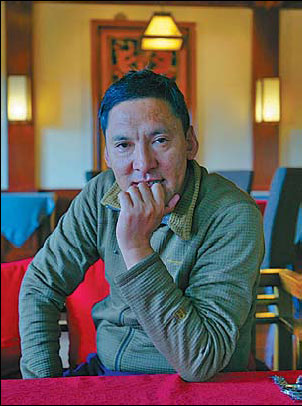
 |
|
Baima Dorji set up the Songtsam Lodges "because he really wanted to express Tibetan culture". Provided to China Daily |
The first interview took place in Beijing.
| |||
Two weeks after that, I was sitting with Baima Dorji in the restaurant of the Songtsam Shangri-La, a steaming tea set in front of us.
We have already restarted our interview once; Baima had decided abruptly that the receptionist acting as translator could not convey his full meaning, and three hotel guests were rounded up instead.
My question that elicited all this had been: "Why did you feel a hotel was a better way of showing Tibetan culture than a TV program?"
Baima had told me he set up the Songtsam Shangri-La in 2001 "because he really wanted to express Tibetan culture". He could not do this, he said, with the programs about Tibet and Yunnan that he made in his job as a documentary directory for CCTV. In 2003, Baima quit CCTV completely to concentrate on the hotels.
"CCTV is a major medium for China," translator number one tells me now, while Baima signals the waiter to pour more tea. "The information you can give is always limited. But Tibetan things are not only simple things. Most people know about Tibetan dancers and artists, but Baima wants to promote Tibetan Buddhist culture to the world."
Baima's insight into Tibet comes from his childhood in Shangri-La and his vast collection of Tibetan art, much of it from one spending spree at a warehouse near Beijing's Panjiayuan antique market.
"On that day, he bought over 50 pieces," translator number two chips in. "He was thinking where he should keep all this culture. So he decides to make a hotel in a Tibetan style."
"At the start, he didn't have a plan," the translator continues, reading from notes taken during one of Baima's 10-minute reminiscences.
"It was fantasy. But then Shangri-La itself isn't really a place; it's a dream. It should not be in the city of Shangri-La; it should be in the countryside, in the blue skies, in the lifestyle. There're some places that tourists cannot find in really small villages, so Baima wants to allow a few people to find the real Shangri-La."
Baima explains the location in Benzilan, a place "written deep on the memory of Tibetans for its handmade wood-painting culture". Not every part of his fantasy could be realized, however; planners vetoed his idea of having guests ferried up a dirt track to the hotel by pack ponies.
Baima admits that he would like to build more hotels in Bhutan, in other parts of Yunnan, "maybe America someday". But he checks himself. Right now he wants to stabilize the current hotels. He is afraid of putting growth before the soul of the hotels.
At nearly 10 pm, a hotpot is placed on the table behind us. My translators, it turns out, have not been allowed to eat yet. Baima makes them wait a moment longer for thank-you presents - cloth bags containing metal bookmarks carved with Tibetan designs.
"This isn't a real hotel," he concludes via his exhausted friends. "It's a platform for travelers to understand more culture and nature. It's to give you a feeling of family on the road.
"People nowadays lack spirituality. I can help them find that spiritual part to improve their lives. Most importantly, I want people to know Tibetan Buddhism."